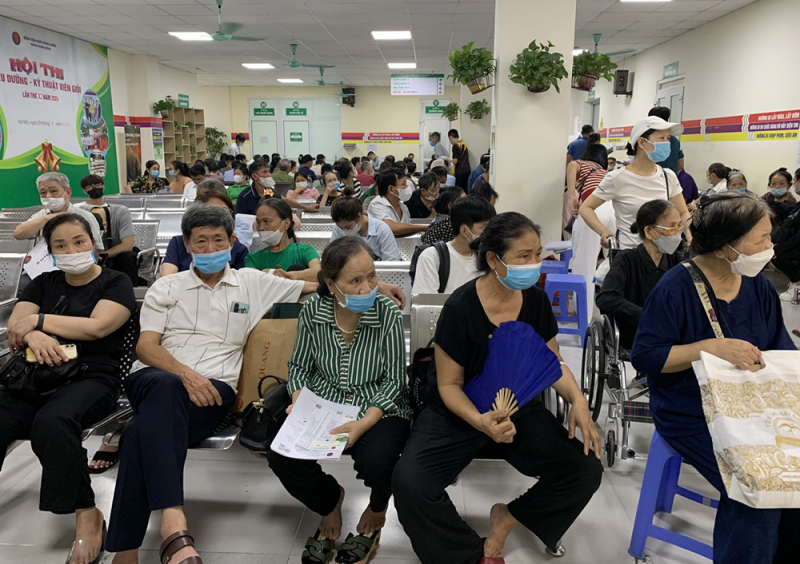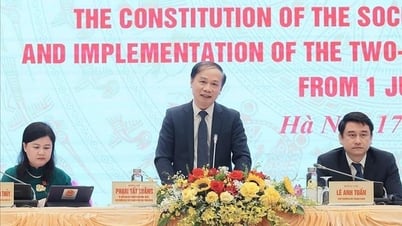The Ministry of Health is considering and in the near future, chronic patients can be given medicine for up to 90 days at a time if they are in a stable treatment group. This is a big step forward in health administrative reform, especially bringing many benefits to patients, especially the elderly and those in remote areas.

Ms. Cao Thi Viet (50 years old, Hanoi ) has had a thyroid disease that has been treated stably for many years. 2 years ago, she discovered that she had prediabetes and has been treated stably. Every month, Ms. Viet has to go to the Central Endocrinology Hospital for a check-up and to get medicine.
“My illness has been stable for many years and has remained that way. I really hope to increase the time to get medicine to 2-3 months to save costs and travel time for patients. Every time I have to go for a check-up, I have to go at 6am, and if I wait quickly, it takes half a day to finish. If it is too crowded, I have to wait until the afternoon, which is very time-consuming and time-consuming,” Ms. Viet shared.
Similarly, Ms. Nguyen Thu Hue (70 years old, Hanoi) was diagnosed with adrenal insufficiency, stable treatment for 2 years now, she also hopes to extend the time of health insurance prescription to 3 months. "My house is far away, every month I have to take my child to the hospital, waiting for examination, testing, and medicine takes a whole morning. If the time of medicine delivery can be extended to 2-3 months to save time having to go back and forth many times, that would be great."
Not only the above two cases, but the vast majority of people with chronic diseases who have been treated for a long time are "crying out" because they have to go to the doctor early in the morning, wait half a day just to get a prescription, the most difficult is for the elderly, living far from the hospital. According to Associate Professor, Dr. Hoang Thanh Tuyen, Director of Hospital 19-8 ( Ministry of Public Security ), if the doctor assesses that the patient's treatment is stable, extending the time to provide medication to 2-3 months is very convenient for the patient. For example, there are people with diabetes, or high blood pressure who have been treated for a long time, it is not necessary to make them go to the hospital every month, which is very inconvenient and overloads the medical facility.
Evaluation after 5 months of pilot implementation of drug dispensing for over 30 days at Xanh Pon General Hospital shows that the number of patients receiving drugs tends to increase gradually every month. The rate of patients having to return for examination within 50 days when receiving drugs for over 30 days is about 3%. This policy has contributed to significantly reducing the frequency of patients coming to the hospital, especially during peak hours such as: 8:00 - 10:00 and 13:00 - 15:00, thereby improving the convenience for professional work in the examination departments.
“Extending the prescription time has reduced pressure on the reception system, registration counter, examination and medication collection area. This policy also contributes to simplifying administrative procedures related to medical examination registration, health insurance payment, reducing waiting in line, especially meaningful for the elderly or people with difficulty in traveling”, Dr. Luong Duc Dung, Head of Planning and Synthesis Department, Xanh Pon General Hospital, assessed.
According to a representative of the Department of Medical Examination and Treatment (Ministry of Health), the Ministry of Health is amending and supplementing Circular No. 52/2017/TT-BYT and the new Circular is expected to be issued on July 1, which will officially allow outpatient prescriptions for up to 2-3 months for chronic diseases on the approved list. According to Circular 52/2017/TT-BYT, the maximum prescription period is only 30 days, and patients, even if their treatment is stable, still have to return for monthly check-ups just to receive medication. Many people, just because of the policy allowing short-term prescriptions, give up their health insurance benefits and choose to buy medicine outside for convenience, leading to a great loss in treatment costs.
Mr. Vuong Anh Duong, Deputy Director of the Department of Medical Examination and Treatment Management, said that extending the prescription period for chronic patients who have been treated stably is completely feasible. During the COVID-19 pandemic, the Ministry of Health allowed the provision of medication every 3 months to limit the number of patients having to go to the hospital. The results showed that the rate of complications or medication adjustments was very low, only about 3%. The list of diseases considered for provision of medication every 3 months not only includes common diseases such as high blood pressure, diabetes, chronic obstructive pulmonary disease or mental disorders, but also extends to about 200 other diseases in many specialties. These include chronic infectious diseases such as hepatitis B, HIV/AIDS, blood and immune diseases such as congenital hemolytic anemia, bone marrow failure, endocrine diseases such as hypothyroidism, thyrotoxicosis and many neurological and degenerative diseases such as Alzheimer's, Parkinson's, dementia.
In particular, some gynecological diseases in adolescents such as menorrhagia and puberty are also considered for extended drug dispensing time. Expanding this list not only helps patients receive treatment more conveniently, but also contributes to reducing the burden on the frontline health system, while improving the quality of chronic and rare disease management in the community.
However, Mr. Vuong Anh Duong said that not all patients on the list will be given 90 days of medication by default. Doctors will base on each patient's specific condition, stability, ability to self-monitor and comply with treatment to decide on the appropriate number of days to prescribe, which can be 30, 60 or 90 days. The prescribing physician must be responsible for his or her decision, and at the same time guide the patient to recognize abnormal signs, how to handle them and when to seek medical attention.
To develop a reasonable and safe list of diseases, the Ministry of Health consulted more than 20 end-line hospitals in different specialties, organized an assessment through a professional council and asked each medical facility to propose specific criteria. Factors such as increased costs, the ability to store drugs at home, and the risk of disease progression or complications were all carefully considered before being included in the final list.
Vietnam Social Security has repeatedly proposed that the Ministry of Health extend the time for providing medicine to 2-3 months to reduce the financial and time burden for patients, and reduce the pressure on overload at hospitals. Many opinions say that increasing the time to get health insurance medicine will reduce the income from medical examination fees for hospitals, or the cost of health insurance medicine may increase slightly... However, many hospitals said that this will not affect the hospital's revenue. The Department of Medical Examination and Treatment Management will coordinate with Vietnam Social Security to provide specific instructions to localities when the Circular is issued, and at the same time organize training and synchronous implementation at hospitals from next July.
Source: https://cand.com.vn/y-te/cap-thuoc-bao-hiem-y-te-3-thang-nhieu-thuan-loi-voi-nguoi-benh-i771315/



























































































Comment (0)